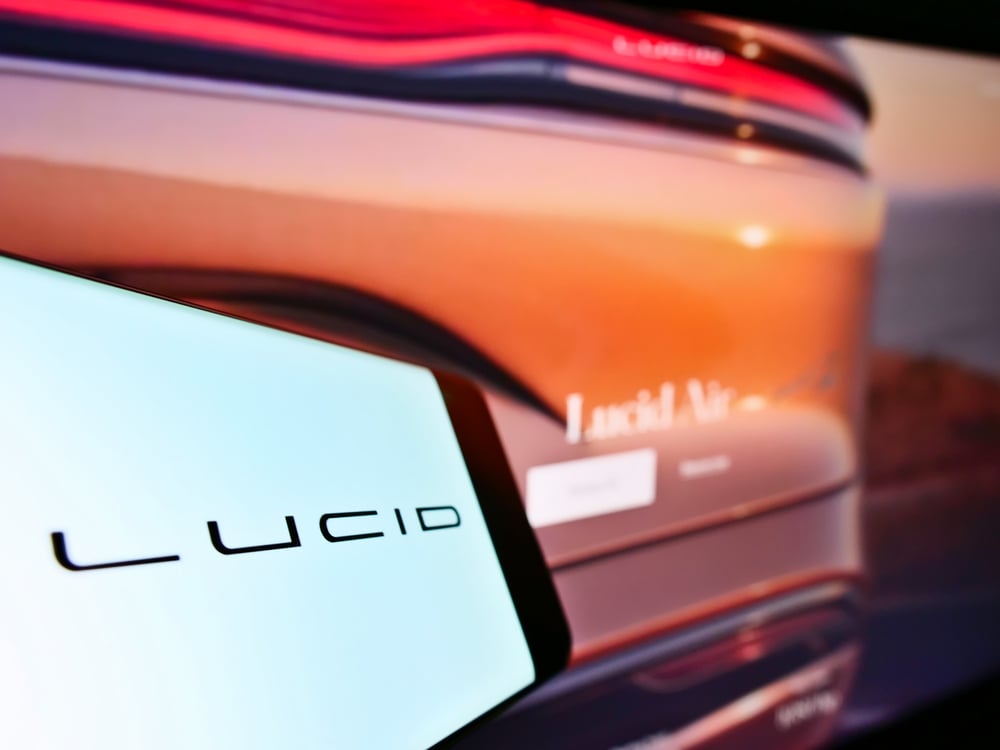Lucid Motors Faces a Reality That May Cloud a Bullish Perception Lucid (LCID) stock continues to fall after completing a $1.5 billion equity offering in an effort to strengthen its balance sheet
This story originally appeared on MarketBeat

On a day when the broader market soared over 500 points, Lucid Group, Inc. (NASDAQ: LCID) was a notable laggard. Shares of LCID stock fell by less than one percent. But it continues the downward trend for the stock, down 30% in the last month and over 80% in 2022.
One sore spot for investors is that the company recently completed a previously announced $1.5 billion equity offering. In a capital-intensive business like electric vehicles (EVs), investors have come to expect that start-up companies will need to raise funds as they achieve scalability.
But when the company announced that one of the stated reasons for the infusion of cash was strengthening its balance sheet, it raised concerns. Specifically because Lucid has delivered some recent victories, one of these was a battery agreement with Panasonic Holdings Corporation (OTCMKTS: PCRFY).
When an Order Isn't an Order
In 2020 and 2021, several EV companies, including Lucid, went public. These companies used one metric to spark investor interest: the number of reservations they had. This represented consumers who had put down a deposit for one of the company's cars. It also gave companies like Lucid the ability to point to potential revenue.
But potential orders aren't the same thing as actual orders. Lucid reports that it will fall significantly short of meeting its full-year goal to deliver 6,000 to 7,000 vehicles.
And consumers, for reasons that are not entirely clear, are beginning to cancel their orders. In the company's most recent earnings report, reservations were down by 3,000 vehicles. While not all of those were cancellations, internal emails show that the company is more than a little concerned that cancellations are becoming a concern.
Should this affect your decision to buy LCID stock? Think about it like this. When company insiders sell their company's stock, it's seen as a negative sign. However, there are many reasons insiders may sell a stock, and most of those have nothing to do with their belief in the company's outlook.
It's possible (and I should put that in air quotes) that the same logic applies here. There can be many reasons for customers to cancel their order. Inflation remains high. Job losses are mounting. Depending on how you view it, the economy is already a recession or soon will be. There are many reasons why customers may be canceling a commitment for an EV that will cost north of $100,000.
But a cancellation is still a cancellation. And that may signal that the EV market is facing supply and demand problems.
Is EV Adoption the Slam Dunk it Appears to Be?
Recent advertising suggests that mass EV adoption is already here. That may be closer to reality in major metropolitan areas. I know in my corner of small-town U.S.A., that's not the case yet.
Of course, one reason is a lack of available vehicles. But it also goes deeper. Aside from one location for Tesla charging, there is no established charging infrastructure. And that's not a reality isolated to my small corner of the world.
Two December news items suggest automakers may also believe this to be the case. First, Toyota Motor Corporation (NYSE: TM) president Akio Toyoda said that there is the silent majority in the auto industry that questions whether the industry should pursue EVs exclusively.
Second, in its annual survey of 900 automotive executives, KPMG, the international consulting and accounting firm, revealed growing pessimism about EV adoption. This was being enhanced by rising inflation and supply chain concerns.
However, the survey also said 50% of the executives were still confident that EV adoption would increase significantly by 2030. Toyoda, however, said that Toyota is still avoiding making a firm commitment to the buildout of an all-electric fleet as the right solution has yet to be determined.
LCID Stock May Still Have Further to Fall
Depending on your perception, electric vehicle adoption is either taking longer than expected or is right on track. Whichever view you have, it will take many years, if not many decades, for mass EV adoption to be a reality.
That doesn't mean LCID stock doesn't have a path to success. Lucid Group is assembling and delivering vehicles. That's more than a lot of SPAC companies can say. But it needs many things to go right on both the supply and demand front. And with the stock trading at over 20x sales, it's more likely to go down than up in a risk-off market.










